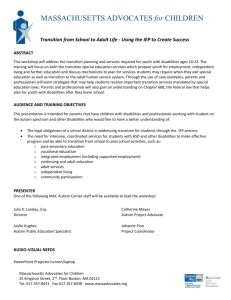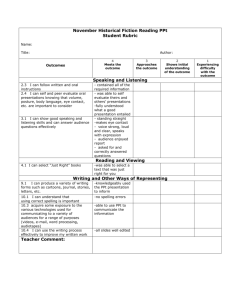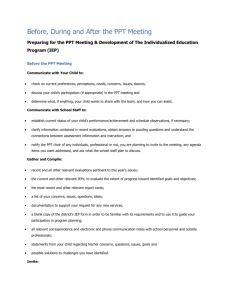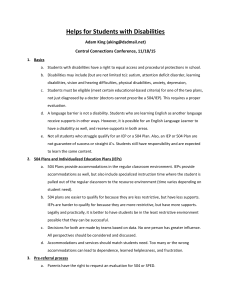Course Prefix/Number: EEX 6992
advertisement
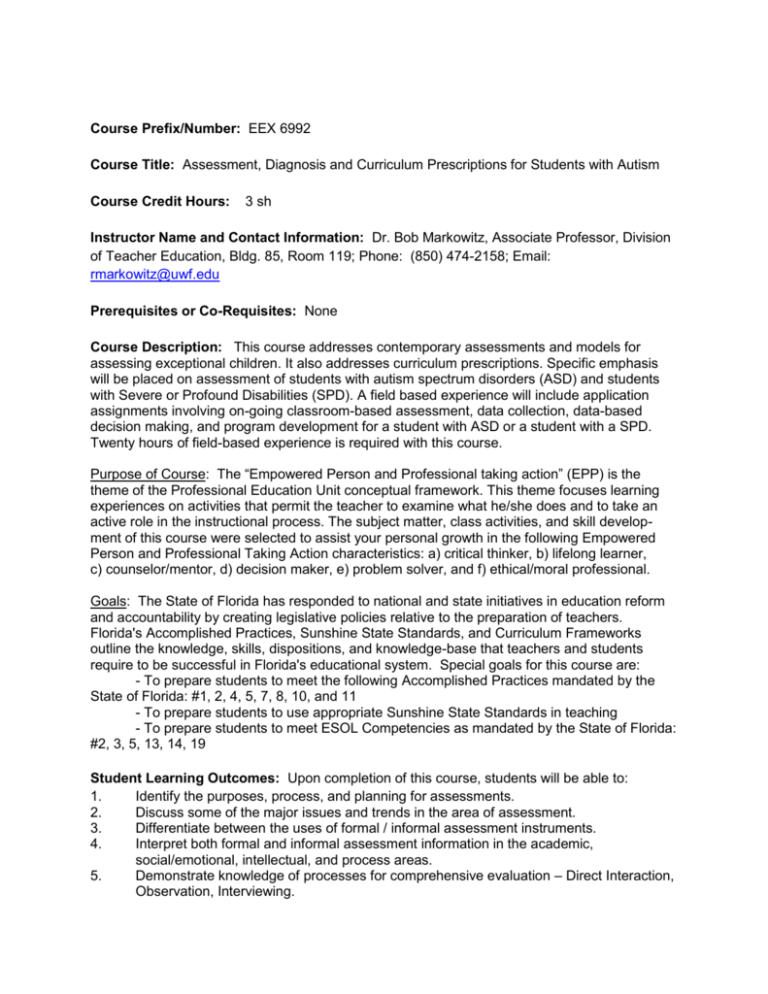
Course Prefix/Number: EEX 6992 Course Title: Assessment, Diagnosis and Curriculum Prescriptions for Students with Autism Course Credit Hours: 3 sh Instructor Name and Contact Information: Dr. Bob Markowitz, Associate Professor, Division of Teacher Education, Bldg. 85, Room 119; Phone: (850) 474-2158; Email: rmarkowitz@uwf.edu Prerequisites or Co-Requisites: None Course Description: This course addresses contemporary assessments and models for assessing exceptional children. It also addresses curriculum prescriptions. Specific emphasis will be placed on assessment of students with autism spectrum disorders (ASD) and students with Severe or Profound Disabilities (SPD). A field based experience will include application assignments involving on-going classroom-based assessment, data collection, data-based decision making, and program development for a student with ASD or a student with a SPD. Twenty hours of field-based experience is required with this course. Purpose of Course: The “Empowered Person and Professional taking action” (EPP) is the theme of the Professional Education Unit conceptual framework. This theme focuses learning experiences on activities that permit the teacher to examine what he/she does and to take an active role in the instructional process. The subject matter, class activities, and skill development of this course were selected to assist your personal growth in the following Empowered Person and Professional Taking Action characteristics: a) critical thinker, b) lifelong learner, c) counselor/mentor, d) decision maker, e) problem solver, and f) ethical/moral professional. Goals: The State of Florida has responded to national and state initiatives in education reform and accountability by creating legislative policies relative to the preparation of teachers. Florida's Accomplished Practices, Sunshine State Standards, and Curriculum Frameworks outline the knowledge, skills, dispositions, and knowledge-base that teachers and students require to be successful in Florida's educational system. Special goals for this course are: - To prepare students to meet the following Accomplished Practices mandated by the State of Florida: #1, 2, 4, 5, 7, 8, 10, and 11 - To prepare students to use appropriate Sunshine State Standards in teaching - To prepare students to meet ESOL Competencies as mandated by the State of Florida: #2, 3, 5, 13, 14, 19 Student Learning Outcomes: Upon completion of this course, students will be able to: 1. Identify the purposes, process, and planning for assessments. 2. Discuss some of the major issues and trends in the area of assessment. 3. Differentiate between the uses of formal / informal assessment instruments. 4. Interpret both formal and informal assessment information in the academic, social/emotional, intellectual, and process areas. 5. Demonstrate knowledge of processes for comprehensive evaluation – Direct Interaction, Observation, Interviewing. 6. 7. 8. 9. 10. 11. 12. 13. 14. 15. 16. 17. 18. 19. 20. 21. Select appropriate instruments based on the purpose for which assessment information is necessary. Demonstrate knowledge of classroom-based assessments including performance-based assessment, portfolio assessment, curriculum-based measurement (CMB), curriculumbased assessment (CBA), error analysis, and behavioral observation strategies. Demonstrate knowledge of specialized assessments including: ADOS, ADI-R, PEP-III, ABLLS, ASIEP, DIBLES, MURDOCK, etc. Implement on-going classroom-based assessment/data collection/data-based decision making/program development for a student with ASD. Design and implement curriculum and instructional strategies for a student with ASD in a specific curricular / developmental area based on assessment information. Design remediation plans based on assessment information. Determine Present Levels of Performance (PLOP) and write measurable IEP goals and objectives and select appropriate benchmarks based on analysis of student assessment information. Demonstrate knowledge of functional assessments, discrepancy analyses, personcentered planning/ futures, and curriculum-based vocational evaluations. Participate as a member of a multidisciplinary team in the discussion of results of assessments or monitoring procedures with other professionals, parents, and students. Communicate assessment and diagnostic information, learning strategies, and remediation plans to parents, other teachers, and other professionals. Analyze and evaluate curriculum materials and strategies as to their effectiveness and appropriateness. Examine and evaluate software as to the appropriateness for exceptional students. Demonstrate how to use and synthesize information provided by other professionals. Discuss the use of technology in planning and managing instructional programs for exceptional children. Students must complete an assessment module that includes a simulation activity for the administration, scoring, and interpretation of several diagnostic tests. Discuss the use of Precision Teaching for students with disabilities and implement a precision teaching project. Topics Covered: High Stakes Testing and Students with Disabilities Critical Issues in Assessment The Process of Assessment Formal Assessment First Do No Harm (article) Alternate Assessment for Students with Severe or Profound Disabilities Measurement Concepts Exemplar WISC and WIAT Report Precision Teaching Precision Teaching Review Worksheet Florida Alternate Assessment Portfolio Assessment The Use of Portfolios for Students with Autism Creating an IEP as a Team Experience Perceptions of Parents of Children with Autism Towards the IEP Meeting Standards-Based IEPs Writing Effective IEPs for Students with Severe or Profound Disabilities Autism Diagnostic Observation Schedule Best Practices for Students with Severe or Profound Disabilities Expectations for Students with Cognitive Disabilities Litigating a FAPE The Autism Case Law A Selective Review of Treatments for Children with Autism Access to the General Curriculum for Students with Significant Cognitive Disabilities The Past, the Present, and Future of Curriculum-Based Research Required Text: No text assigned at this time. Readings will be provided via WebCourse Grading / Evaluation: Instructor’s Caveat - The instructor reserves the right to modify the schedule with timely notice to students. Opportunities to embrace unexpected learning experiences will be valued and capitalized upon.* You may notice that there are two readings columns. Most times, the main instructional materials are the same. However, additional readings, videos, and information have been provided for those students engaged in the SPD Certificate or Endorsement program. MODULE NAME READINGS - PROJECT ASD COHORT Welcome to WebCourses High Stakes Testing and Students with Disabilities (article) Article on Autism (your choice) READINGS - PROJECT SPD COHORT High Stakes Testing and Students with Disabilities (article) Article on Severe or Profound Disabilities (your choice) ACTIVITIES DUE Overview of Assessment Formal Assessment Critical Issues in Assessment (ppt) The Process of Assessment (word doc) Formal Assessment (ppt) Measurement Concepts (ppt) Exemplar WISC and WIAT Report (word doc) Informal Assessment Informal Assessment (ppt) Precision Teaching (ppt) Precision Teaching Review Worksheet (word doc) Critical Issues in Assessment (ppt) The Process of Assessment (word doc) Formal Assessment (ppt) Measurement Concepts (ppt) Exemplar WISC and WIAT Report (word doc) Informal Assessment (ppt) Precision Teaching (ppt) Precision Teaching Review Worksheet (word doc) Introductory email to instructor Personal Introduction Discussion Posting EBSCO host Discussion Posting Welcome to Web Courses Quiz File Review Interview with a Professional Diagnostician Precision Teaching Project Alternate and Portfolio Assessment Florida Alternate Assessment (ppt) Florida Alternate Assessment Training Video Portfolio Assessment The Use of Portfolios for Students with Autism (article) IEPs Autism Specific Assessments Assessments Specifically for Students with Severe or Profound Disabilities Assessment, Placement, and the Law Assessing Curriculum and Assistive Technology Creating an IEP as a Team Experience (ppt) Perceptions of Parents of Children with Autism Towards the IEP Meeting (article) Standards-Based IEPs (article) Writing Effective IEPs for Students with Severe or Profound Disabilities (ppt) Autism Diagnostic Observation Schedule (ppt) Choose 3 addition power points to review Best Practices for Students with Severe or Profound Disabilities (ppt) Expectations for Students with Cognitive Disabilities (article) Litigating a FAPE (article) The Autism Case Law (article) Grading Scale A = 90-100 B = 80-89 C = 70-79 D = 65-69 F = below 65 A Selective Review of Treatments for Children with Autism (article) The Past, the Present, and Future of Curriculum-Based Research (article) Florida Alternate Assessment (ppt) Florida Alternate Assessment Training Video Portfolio Assessment First Do No Harm (article) Alternate Assessment for Students with Severe or Profound Disabilities (ppt) Creating an IEP as a Team Experience (ppt) Standards-Based IEPs (article) Writing Effective IEPs for Students with Severe or Profound Disabilities (ppt) Portfolio Assessment Project IEP Project Autism Diagnostic Observation Schedule (ppt) Choose 3 addition power points to review Best Practices for Students with Severe or Profound Disabilities (ppt) Expectations for Students with Cognitive Disabilities (article) Litigating a FAPE (article) Legal File Archives (article) Access to the General Curriculum for Students with Significant Cognitive Disabilities (article) The Past, the Present, and Future of Curriculum-Based Research (article) Commonly Used Assessments Commonly Used Assessments Legal Brief Types of Assistive Technology Chart Expectations for Academic Conduct/Plagiarism Policy: As members of the University of West Florida, we commit ourselves to honesty. As we strive for excellence in performance, integrity—personal and institutional—is our most precious asset. Honesty in our academic work is vital, and we will not knowingly act in ways which erode that integrity. Accordingly, we pledge not to cheat, nor to tolerate cheating, nor to plagiarize the work of others. We pledge to share community resources in ways that are responsible and that comply with established policies of fairness. Cooperation and competition are means to high achievement and are encouraged. Indeed, cooperation is expected unless our directive is to individual performance. We will compete constructively and professionally for the purpose of stimulating high performance standards. Finally, we accept adherence to this set of expectations for academic conduct as a condition of membership in the UWF academic community. The Student Code of Conduct sets forth the rules, regulations and expected behavior of students enrolled at the University of West Florida. Violations of any rules, regulations, or behavioral expectations may result in a charge of violating the Student Code of Conduct. It is the student’s responsibility to read the Student Code of Conduct and conduct himself/herself accordingly. You may access the current Student Code of Conduct at http://www.uwf.edu/judicialaffairs. Assistance: Students with a documented disability who require specific examination or course related academic accommodations should contact the Student Disability Resource Center (SDRC) by email at sdrc@uwf.edu or by phone at 850.474.2387.
